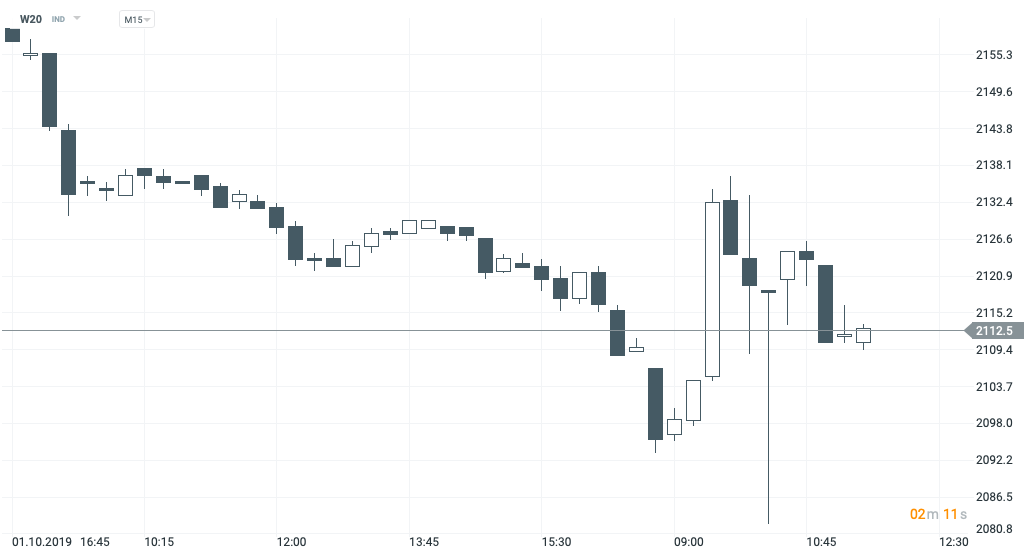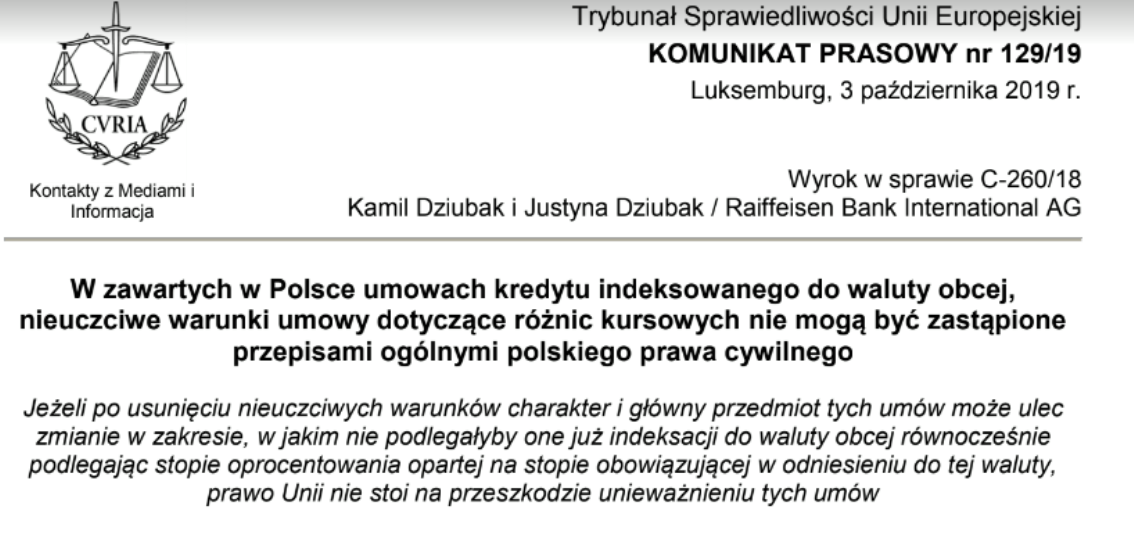There is a judgment of the CJEU on loans in francs
From a big cloud, a little rain - this is how you can summarize the judgment of the European Court of Justice (CJEU) on loans taken in Swiss francs. Not only the entire banking sector was waiting for him, but also hundreds of thousands of Poles who took loans in Swiss currency. The judgment is favorable for the borrowers, but it will not be a breakthrough in the case.
What will change? If the borrower decides to fight the court with the bank that gave him the loan in francs, the courts will have to take into account the judgment of the CJEU. However, each case will be considered individually. In short: this does not mean that loans will be automatically converted.
Despite this, experts say the judgment is beneficial to franc borrowers. The judges also facilitated the possible cancellation of contracts due to unfair clauses in consumer contracts.
Why did the case deal with the CJEU?
An EU tribunal became interested in the issue of loans in francs after the famous case of the Dziubak family. They took out a franc loan in 2008 and the rules for indexing it were set out in the loan agreement. The bank used an internal table for conversion. The Dziubak family demanded the annulment of the entire loan agreement.
Judge Kamil Kamil Gołaszewski from the District Court in Warsaw decided to send questions to the CJEU in 2018:
- If the effect of recognizing certain contractual provisions determining the manner in which the parties perform the service (its amount) as unfair contractual terms within the meaning of Directive 93 / 13 / EEC would be to the detriment of the collapse of the entire contract, it would be possible to fill the gaps in the contract not based on for a disposable provision constituting an unequivocal replacement of an unfair condition, but based on the provisions of national law, which provide for supplementing the effects of a legal act expressed in its content also by effects arising from the principles of equity (principles of social coexistence) or established habits?
- Should a possible assessment of the consequences of the collapse of the entire contract for the consumer take place taking into account the circumstances existing at the time of its conclusion or at the time of dispute between the parties regarding the effectiveness of the clause (reliance by the consumer on its abusiveness) and what is the importance of the position expressed in the course of such dispute by the consumer?
- Is it possible to maintain the provisions which constitute unfair contractual terms if the adoption of such a solution would be objectively beneficial to the consumer at the time the dispute is resolved?
- Can the recognition of the contractual provisions specifying the amount and manner of performance by the parties as unfair lead to a situation in which the shape of the legal relationship established on the basis of the content of the contract, disregarding the effects of unfair terms, will differ from the one covered by the parties' intention in terms of the main performance of the parties, in particular - Does the recognition of a contract term as unfair means that it is possible to continue to apply other, not subject to the allegation of abusiveness, contractual provisions, defining the consumer's main service, the shape agreed by the parties (introducing them to the contract) was inextricably linked with the provision questioned by the consumer?
- The key point is at the last point. The judge asked if it is possible to maintain the contract in its current form, and only remove from it the unauthorized fragment. In this case, this would mean removing the clause defining the rules for converting the loan amount and installments into francs and the loan would actually become a PLN loan (such currency is indicated in the indexed loan agreement) with an interest rate based on the LIBOR (typical for "franc" mortgages).
The Court's replies
The Court addressed each point. He stated, inter alia that the unfair terms and conditions of the contract regarding exchange rate differences cannot be replaced by general provisions of Polish civil law. The CJEU also noted in the judgment that EU legislation is not an obstacle to the annulment of Swiss franc loan agreements, but - as emphasized - each case must be treated individually.
Moreover, the tribunal emphasizes that in Poland unfair contract terms cannot be replaced by general provisions of Polish civil law, and the consumer must have the right to refuse to be protected against harmful effects caused by the cancellation of the contract as a whole - writes the portal Bankier.pl
Market reaction
The situation on the Polish stock exchange was exceptionally dynamic. Just before the time of the judgment, the shares of banks that have the largest “shares” in CHF loans grew dynamically (eg mBank even over 6%), and the WIG 20 rebounded from -1% to + 1%. Immediately after the announcement of the verdict, the Polish index returned with an extreme pace, which it achieved (-2,5%). Just over an hour after the CJEU's verdict, the index of the 20 largest companies is circulating on the balance sheet of the day around 0%.

WIG20 chart, M15 interval. Source: xNUMX XTB xStation
Was the market really expecting this to happen? In the case of the Polish zloty, such a turn of events turned out to be positive, and the PLN strengthened against all major currencies - from 0,2% (EUR) to 0,9% (CHF).






















![Forex Club – Tax 9 – Settle tax on a foreign broker [Download the Application] Forex Club - Tax 9](https://forexclub.pl/wp-content/uploads/2024/02/Forex-Club-Podatek-9-184x120.jpg?v=1709046278)
![Trading View platform – solutions tailored to the needs of traders [Review] trading view review](https://forexclub.pl/wp-content/uploads/2024/03/trading-view-recenzja-184x120.jpg?v=1709558918)
![How to connect your FP Markets account to the Trading View platform [Guide] fp markets trading view](https://forexclub.pl/wp-content/uploads/2024/02/fp-markets-trading-view-184x120.jpg?v=1708677291)
![How to invest in ChatGPT and AI? Stocks and ETFs [Guide] how to invest in chatgpt and artificial intelligence](https://forexclub.pl/wp-content/uploads/2023/02/jak-inwestowac-w-chatgpt-i-sztuczna-inteligencje-184x120.jpg?v=1676364263)




![Izabela Górecka – “Success on the market depends not only on knowledge, but also on emotional stability” [Interview] Izabela Górecka - interview](https://forexclub.pl/wp-content/uploads/2024/04/Izabela-Gorecka-wywiad-184x120.jpg?v=1713870578)
![WeWork – the anatomy of the collapse of a company valued at $47 billion [WeWork, part II] wework bankruptcy story](https://forexclub.pl/wp-content/uploads/2024/04/wework-bankructwo-historia-184x120.jpg?v=1711729561)
![Adam Neumann – the man who screwed up Softbank [WeWork, part AND] adam neumann wework](https://forexclub.pl/wp-content/uploads/2024/04/adam-neumann-wework-184x120.jpg?v=1711728724)




![The most common mistakes of a beginner trader - Mr Yogi [VIDEO] Scalping - The most common mistakes of a beginner trader - VIDEO](https://forexclub.pl/wp-content/uploads/2024/03/Scalping-Najczestsze-bledy-poczatkujacego-tradera-VIDEO-184x120.jpg?v=1711601376)
![Learning patience: No position is also a position - Mr Yogi [VIDEO] Scalping - Learning patience - No position is also a position - VIDEO](https://forexclub.pl/wp-content/uploads/2024/03/Scalping-Nauka-cierpliwosci-Brak-pozycji-to-tez-pozycja-VIDEO-184x120.jpg?v=1710999249)
![When to exit a position and how to minimize losses - Mr Yogi [VIDEO] Scalping - When to exit a position and how to minimize losses - VIDEO](https://forexclub.pl/wp-content/uploads/2024/03/Scalping-Kiedy-wyjsc-z-pozycji-i-jak-minimalizowac-straty-VIDEO-184x120.jpg?v=1710336731)




















Leave a Response